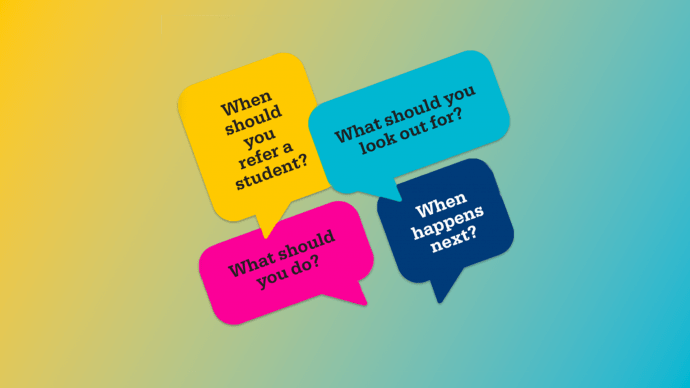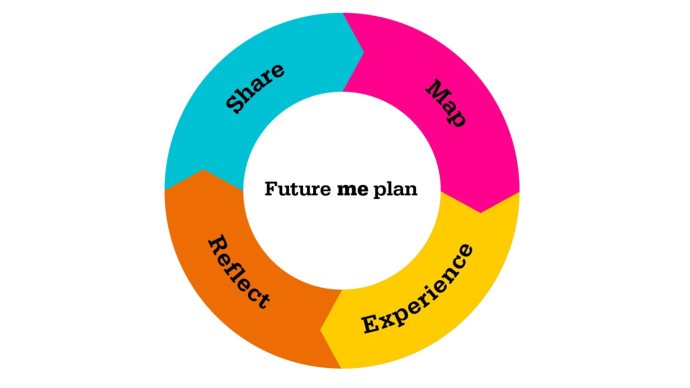Personal Tutoring Strategies and Tips Toolbox
Introduction
An analysis of data from the Manchester Met Student Awards for teaching staff for the category of Best Personal Tutor identified three facets of a fruitful relationship that can make students feel supported, motivated, and sometimes inspired:
- The tutor cares about me.
- Helps me improve my work.
- Values me as a learner.
This analysis, a coaching approach and the 3Cs guide the activities of Personal Tutoring at Manchester Met. The tabs below provide strategies, tips and advice for a range of scenarios that Personal Tutors may experience.

Strategies and Tips Toolbox
-
Using Coaching Techniques in Personal Tutorials
Coaching techniques take a non-directive approach to personal tutoring meetings, that focus on the student and aim to support them to identify their own goals and issues and develop strategies and solutions. In this way, the tutor’s role is to ask questions to raise awareness, summarise, reflect back what a student has said, and in doing this, to try to use the same language as the student. Two simple coaching models are presented below. Both work with the idea that anyone can be trained to solve their own problems to some extent.
COACHING STYLES
The text below shows styles moving downwards from non-directive to directive:
Helping someone solve their own problems (Non-Directive Pull Style)
- Listening to understand
- Reflecting
- Paraphrasing
- Summarising
- Asking questions that raise awareness
- Making suggestions
- Giving feedback
- Offering guidance
- Giving advice
- Instructing
- Telling
Solving someone’s problem for them (Directive Push Style)
Using a coaching model always involves:
Active Listening - this involves attention to body language, and other skills of communication. See this article Become a Better Listener on the PsychCentral website.
Open Questioning - using questions that do not simply prompt the answer ‘Yes’ or ‘No’. For example asking ‘How are you preparing for the exams?’ rather than ‘Are exams something you like?’
One of the least useful questions to ask can be ’How’s it going?’ – because we tend to answer ‘Fine’ whether this is true or not. Try to ask open questions that are specific.
COACHING MODELS
The GROW model has been widely used and although there are much more complex models of coaching, this very simple model provides a good starting point to shape a proactive tutorial.
For instance, asking the student about their goals (which could be long term or short term):
Goal: E.g. How do you think you will get on with the module in analytical chemistry this year? This could open up into a discussion about whether the student is concerned about their level of mathematical ability, or other concerns about the topic. Or it could lead to reflection on their level of attendance on the unit due to their commitments to earn money outside of the university.
Reality: E.g. How do you manage to fit your work commitments around your course? The student might talk about their work patterns changing or that they have been asked to lead a team or that late night shifts make attending classes early in the day difficult for them.
Options: E.g. What other ways could you access course materials to catch up on sessions you miss? What other sources of funding could you access? Are there periods of time when you could work more intensively on your course / in paid employment to free you up for the exam period (etc)?
Way Forward: What do you think you will do before we next meet?
Try to encourage students to set SMART goals:
- Specific
- Measureable
- Action-oriented
- Realistic
- Time-constrained
The CIGAR model is a variation of the GROW model:
- Current situation
- Ideal outcome
- Gap between C and I
- Action plan
- Review
This model also enables a student to set goals and actions but specifically includes the idea of review at the next meeting. It also implies analysis of the gap between goals and realities.
-
Proactive Meetings (tutor-initiated)
These are meetings that are timetabled or tutor-initiated at each level for every student and have clear purposes and sometimes, specific content. In many cases, these kinds of meetings will be designed to align with the PDP activity in the department.
The first meeting may typically include:
a general welcome and orientation; if this is 2nd or 3rd year UG then this might be a link meeting to last year’s performance – perhaps considering exam results or final level marks.
basic boundary setting.
explanation of the goals of Academic Tutorials in the department.
the role and responsibilities of the tutor.
setting and agreeing expectations and responsibilities of the student.
Subsequent meetings could focus on:
feedback from work submitted - how does the student think they did? How would s/he have assessed their performance?
option choice for the next level - linking this to career goals if appropriate.
PDP including, for example, a personal SWOT analysis or some thinking around work experiences they have enjoyed/not enjoyed.
In some cases, the tutorials may also be used for formal Personal Development Planning within a department’s own scheme.
The final meeting of the level will include discussion of achievement at the level completed and transition to the next level. When deciding on the content or structure of the final meeting in a level, it may be useful to consider how transition to the following year is supported and to develop activity around this. For example, an end of year ‘report’ or reflection by the student could be used to discuss progress towards objectives and goal setting for the period to come. The student may want to discuss what their major achievements are and how they might record these for employability purposes.
-
Reactive Meetings (student-initiated)
These occur when a student has an unexpected issue that may impact on their academic performance and that they therefore need to discuss with an academic tutor. They will often involve advising a student how to make an application for exceptional factors, how to make sense of marks received that may not be what was hoped for or to communicate more complex needs around health or welfare issues that affect academic performance. These meetings are almost always student-initiated and their content often unpredictable. As well as the coaching model, an adaptive guidance model can also be helpful in this situation.
As these may arise at any time, it is necessary to discuss the possibilities for these meetings to occur during the boundary setting that forms part of the first proactive meeting:
If a student needs to come and see you for any reason, when are your office hours? Can a student come to you outside of these times? How should they do this? (arrange by email or other method?) what if they have a sudden crisis?
In some cases, you may need to refer them to other services. It is helpful to explain that this is not because you don’t want to help them, but because sometimes other professionals are better placed to deal with some issues than you are. You are not abandoning them, merely seeking to signpost them to the best possible help.
The expectation on you as a personal tutor to provide some kind of pastoral care to your student tutees, will vary to a large extent depending on your discipline area. For example, students in healthcare (e.g. Nursing) may need very different levels of personal and pastoral support as they learn to deal with, for example, patients’ end of life care issues, than students studying in other areas. Nonetheless, many students do experience their own significant life events during their time at university and may need help in finding a ways to cope.
Of course, many students may not wish to involve a tutor, but where the student has sought help the role of the academic tutor is usually to:
provide a sounding board for issues that the student has brought.
advise on the effects of these issues on attendance, assessment, and academic performance.
refer the student to the most relevant sources of help as appropriate.
-
How do students and tutors see their relationship
How Do You Think of Your Students?
Consider how this changes our perceptions - if we think of our students as “future colleagues”, for example, what implications does that have for the way we interact with students in tutorial settings? See the quote above for ways that tutors may think of their students.
How Do Students See the Tutor-Student Relationship?
The nominations for the category of Best Personal Tutor at the MMU Student Awards for teaching staff were analysed to provide these figures.
Attribute of personal tutor % of nominations including this attribute Helps me improve my work 27 Cares about me 25 Values me as a learner/believes in me 24 Is never too busy/is available 19 Helps and supports me 15 Gives advice 14 Listens 14 Helps me feel I belong here 10 Inspires me 9 Makes me feel I can talk about anything 7 Encourages me 7 Is organised 6 Helps me build my conficnece 6 Sorts things out for me without making a fuss 6 Knows me 6 Is responsive 5 Is friendly 5 Challenges me to grow 4 Is positive/enthusiastic 4 Helps me develop resilience 3 Directs me to things 3 Is diplomatic/patient 3 Monitors my progress 2
Personal Tutoring Refresher Screencast
Personal Tutoring Refresher
In this more in-depth screencast, Dr Eileen Pollard explains the Personal Tutoring policy at Manchester Met, some key coaching models and how and when to refer. This resource is designed for both experienced and new Personal Tutors.Please note that My5YP has changed to Future me plan.
Internal staff resources

Student Referral (staff only)
You may not always be the person best placed to help. Confidently direct students to the support they need.
Student and Staff Mental Health Training Programme
This staff and student mental health training has been developed as part of the Mental Health and Wellbeing Project and in conjunction with the Charlie Waller Memorial Trust.Future me plan

Future me plan
Future me plan is a personal development plan for students. It helps them navigate opportunities, reflect on their experiences, and share their progress. You can support your students with their plan and help them set goals.Personal Tutoring Staff Development Workshops
The UTA offers workshops that can also be arranged as bespoke sessions for programme teams and departments. These include:
-
Personal Tutoring: Using Coaching.
-
Personal Tutoring: Hard Conversations, Referrals and Boundaries.
-
Helping Students in Distress.
-
Future me plan Staff Workshop.
Please contact [email protected] for further details, or see the UTA intranet pages for forthcoming scheduled sessions.

Personal Tutoring Contact
Personal Tutoring Contact
If you have further questions about Personal Tutoring, please contact Eileen Pollard. Click on the profile card for more details.

